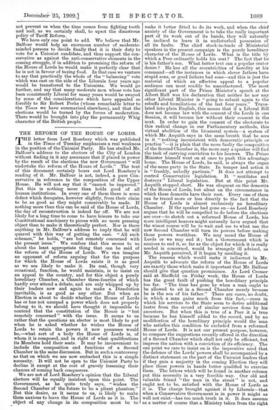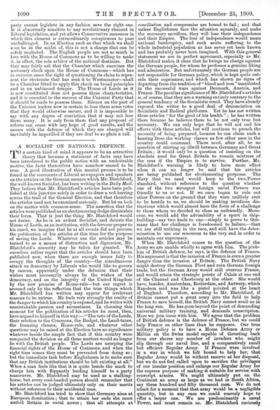THE REFORM OF THE HOUSE OF LORDS.
THE letter from Lord Rosebery which was published in the Times of Tuesday emphasises a real weakness in the position of the Unionist Party. He has studied Mr. Balfour's address to the electors of the City of London without finding in it any assurance that if placed in power by the result of the elections the new Government " will undertake the reform of the House of Lords." The text of this document certainly bears out Lord Rosebery's reading of it. Mr. Balfour is not, indeed, a pure Con- servative in reference to the composition of the Upper House. He will not say that it "cannot be improved." But this is nothing more than holds good of all human institutions. In every one of them there is some defect which derogates, however slightly, from their claim to be as good as they might conceivably be made. If nothing more than this can be said of the House of Lords, the day of reconstruction is indeed far off. We are not likely for a long time to come to have leisure to take our Constitutional machinery to pieces with no more pressing object than to make it theoretically perfect. Nor is there anything in Mr. Balfour's address to imply that he will quarrel with this way of putting the case. " All such schemes," he holds, " are but remotely concerned with the present issue." We confess that this seems to us about the least appropriate thing that can be said of the reform of the House of Lords. We can imagine an opponent of reform arguing that for the purpose for which the House of Lords exists it is as good as we are likely to make it. Its real, though very occasional, function, he would maintain, is to insist on an appeal to the country, and for this object a purely hereditary Chamber, a Chamber three-fourths of which hardly ever attend a debate, and are only whipped up by their leaders now and again to make a Dissolution inevitable, is as good as any other. But when an Election is about to decide whether the House of Lords has or has not usurped a power which does not properly belong to it, we should have thought it impossible to contend that the constitution of the- House is " but remotely concerned" with the issue. It seems to us rather that the questions an elector is most likely to put when he is asked whether he wishes the House of Lords to retain the powers it now possesses would be,—what sort of a body the House of Lords is, of whom it is composed, and in right of what qualifications its Members hold their seats. It may be inconvenient to include the composition and functions of a Second Chamber in the same discussion. But in such a controversy as that on which we are now embarked this is a' simple necessity: It will not be open to the Unionist Party to decline it except at the cost of gravely lessening their chances of coming back conquerors.
We are not of Lord Rosebery's opinion that the Liberal electors will he equally insistent upon this point. The Government, as he quite truly says, " wishes the Second Chamber of the future to be a pliant phantom." But this desire, as it seems to us, - is likely to make them anxious to leave the House of Lords as it is. • The object - of any change in its composition 'must be to make it better fitted to do its work, and when the chief anxiety .of the Government is to take the really important part of its work out of its hands, they will naturally be inclined to leave it in undisturbed possession of all its faults. The chief stock-in-trade of Ministerial speakers in the present campaign is the purely hereditary character of the House of Lords. What is the title by which a Peer ordinarily holds his seat? The fact that he is his father's son. What better text can a popular orator desire ? He has all the eccentricities of heredity at his command—all the instances in which clever fathers have stupid sons, or good fathers bad sons—and this is just the material of which an effective appeal to a popular audience can most readily be manufactured. The most significant part of the Prime Minister's speech at the Albert Hall was his declaration that neither he nor any other Liberal Minister is " going to submit again to the rebuffs and humiliations of the last four years." Trans- lated into plain English, this means that if a, Liberal Bill does not become law with the consent of the Lords in one Session, it will become law without their consent in the next. In order to gain the consent of the electorate to this radical change in our Parliamentary methods, this virtual abolition of the bicameral system—a system of which Mr. Asquith says in the same breath that he sees in it " nothing inconsistent with democratic principle or practice "—it is plain that the more faulty the composition of the Second Chamber is, the more easy a speaker will find the task of carrying conviction to his hearers. The Prime Minister himself went on at once to push this advantage home. The House of Lords, he said, is always the organ of the same party in the State. In temper and action it is " frankly, nakedly partisan." It does not attempt to control Conservative legislation. It " mutilates and destroys " Liberal legislation. But at this point Mr. Asquith stopped short. He was eloquent on the demerits of the House of Lords, but silent on the circumstance in which these demerits have their root. Every one of them can be traced more or less directly to the fact that the House of Lords is almost exclusively an hereditary Chamber. If the speaker had gone on—as Lord Rosebery argues that he will be compelled to do before the elections are over—to sketch out a reformed House of Lords, his more intelligent hearers might naturally have argued that the wisest course will be to wait and see to what use the new Second Chamber will turn its powers before making those powers worthless. We may mend the House of Lords or we may end it ; but a Government which is anxious to end it; so far as the object for which it is really needed is concerned, would be strangely ill advised, as Mr. Asquith perceived, if it began by mending it. The reasons which would make it indiscreet in Mr. Asquith to advocate the reform of the House of Lords are exactly those which make it important that Mr. Balfour should give that question prominence. As Lord Cromer said at Sheffield on Friday week, the House of Lords has the great fault of pushing the hereditary principle too far. " The time has gone by when a man ought to be allowed to sit in a Second Chamber merely because he is the son of his father." There are cases, no doubt, in which a man gains much from this fact,—cases in which his services to the State seem 'to derive additional lustre from the record of similar services done by his ancestors. But when this is true of a Peer it is true because he has himself added to the record, and by no modification of the hereditary principle would the man who satisfies this condition be excluded from a reformed House of Lords. It is not our present purpose, however, to compare the suggestions recently offered in the direction of a Second Chamber which shall not only be efficient, but impress the nation with a conviction of its efficiency. The one point we care to insist on is the imperative need that the defence of the Lords' powers shall be accompanied by a distinct statement on the part of the Unionist leaders that if they gain a majority in the coming Election they will place these powers in hands better qualified to exercise them. The letters which will be found in another column put this necessity in a very forcible way. Our old and valuable friend " the man in the street " is not, and ought not to be, satisfied with the House of Lords as it is. The charge brought against it by Liberals—that when a Conservative Government is in power it might as well not exist—has too much truth in it. It does assume as a' matter of course that a Ministry taken from the right party cannot legislate in any fashion save the right one. It is abnormally sensitive to any revolutionary element in Liberal legislation, and yet allows Conservative measures in which this element is extraordinarily conspicuous to pass unchallenged.. In an Election such as that which we shall soon be in the midst of, this is not a charge that can be safely neglected. The English people are not so much in love with the House of Commons as to be willing to make it, in effect, the sole arbiter of the national destinies. But they may fairly ask that the Chamber which exercises the necessary check upon the House of Commons—which has in extreme cases the right of questioning its claim to repre- sent the electorate that has sent it to Westminster—shall be a Chamber fitted to apply this check on broad principles and in an unbiassed temper. The House of Lords as it is now constituted does not possess these characteristics, and it is essential to the success of the Unionist Party that it should be made to possess them. Silence on the part of the Unionist leaders now is certain to lose them some votes that they would otherwise secure, and it is impossible to say with any degree of conviction that it may not lose them many. It is only from them that any proposal of reform can come with any hope of good results, and the causes with the defence of which they are charged will inevitably be imperilled if they are deaf to so plain a call.



































 Previous page
Previous page